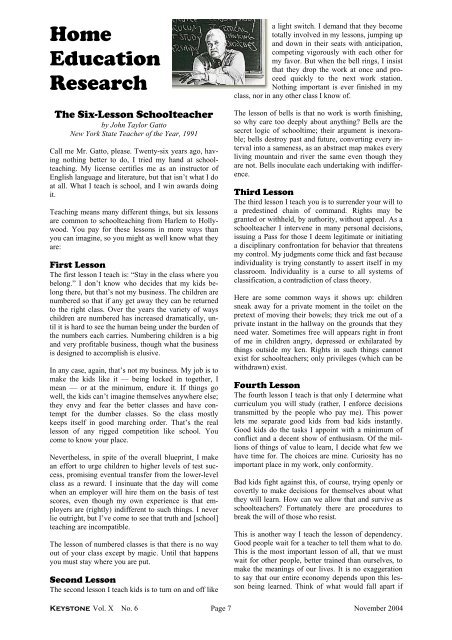But one thing I do - Home Education Foundation
But one thing I do - Home Education Foundation
But one thing I do - Home Education Foundation
You also want an ePaper? Increase the reach of your titles
YUMPU automatically turns print PDFs into web optimized ePapers that Google loves.
<strong>Home</strong><br />
<strong>Education</strong><br />
Research<br />
The Six-Lesson Schoolteacher<br />
by John Taylor Gatto<br />
New York State Teacher of the Year, 1991<br />
Call me Mr. Gatto, please. Twenty-six years ago, having<br />
no<strong>thing</strong> better to <strong>do</strong>, I tried my hand at schoolteaching.<br />
My license certifies me as an instructor of<br />
English language and literature, but that isn’t what I <strong>do</strong><br />
at all. What I teach is school, and I win awards <strong>do</strong>ing<br />
it.<br />
Teaching means many different <strong>thing</strong>s, but six lessons<br />
are common to schoolteaching from Harlem to Hollywood.<br />
You pay for these lessons in more ways than<br />
you can imagine, so you might as well know what they<br />
are:<br />
First Lesson<br />
The first lesson I teach is: “Stay in the class where you<br />
belong.” I <strong>do</strong>n’t know who decides that my kids belong<br />
there, but that’s not my business. The children are<br />
numbered so that if any get away they can be returned<br />
to the right class. Over the years the variety of ways<br />
children are numbered has increased dramatically, until<br />
it is hard to see the human being under the burden of<br />
the numbers each carries. Numbering children is a big<br />
and very profitable business, though what the business<br />
is designed to accomplish is elusive.<br />
In any case, again, that’s not my business. My job is to<br />
make the kids like it — being locked in together, I<br />
mean — or at the minimum, endure it. If <strong>thing</strong>s go<br />
well, the kids can’t imagine themselves anywhere else;<br />
they envy and fear the better classes and have contempt<br />
for the dumber classes. So the class mostly<br />
keeps itself in good marching order. That’s the real<br />
lesson of any rigged competition like school. You<br />
come to know your place.<br />
Nevertheless, in spite of the overall blueprint, I make<br />
an effort to urge children to higher levels of test success,<br />
promising eventual transfer from the lower-level<br />
class as a reward. I insinuate that the day will come<br />
when an employer will hire them on the basis of test<br />
scores, even though my own experience is that employers<br />
are (rightly) indifferent to such <strong>thing</strong>s. I never<br />
lie outright, but I’ve come to see that truth and [school]<br />
teaching are incompatible.<br />
The lesson of numbered classes is that there is no way<br />
out of your class except by magic. Until that happens<br />
you must stay where you are put.<br />
Second Lesson<br />
The second lesson I teach kids is to turn on and off like<br />
a light switch. I demand that they become<br />
totally involved in my lessons, jumping up<br />
and <strong>do</strong>wn in their seats with anticipation,<br />
competing vigorously with each other for<br />
my favor. <strong>But</strong> when the bell rings, I insist<br />
that they drop the work at once and proceed<br />
quickly to the next work station.<br />
No<strong>thing</strong> important is ever finished in my<br />
class, nor in any other class I know of.<br />
The lesson of bells is that no work is worth finishing,<br />
so why care too deeply about any<strong>thing</strong>? Bells are the<br />
secret logic of schooltime; their argument is inexorable;<br />
bells destroy past and future, converting every interval<br />
into a sameness, as an abstract map makes every<br />
living mountain and river the same even though they<br />
are not. Bells inoculate each undertaking with indifference.<br />
Third Lesson<br />
The third lesson I teach you is to surrender your will to<br />
a predestined chain of command. Rights may be<br />
granted or withheld, by authority, without appeal. As a<br />
schoolteacher I intervene in many personal decisions,<br />
issuing a Pass for those I deem legitimate or initiating<br />
a disciplinary confrontation for behavior that threatens<br />
my control. My judgments come thick and fast because<br />
individuality is trying constantly to assert itself in my<br />
classroom. Individuality is a curse to all systems of<br />
classification, a contradiction of class theory.<br />
Here are some common ways it shows up: children<br />
sneak away for a private moment in the toilet on the<br />
pretext of moving their bowels; they trick me out of a<br />
private instant in the hallway on the grounds that they<br />
need water. Sometimes free will appears right in front<br />
of me in children angry, depressed or exhilarated by<br />
<strong>thing</strong>s outside my ken. Rights in such <strong>thing</strong>s cannot<br />
exist for schoolteachers; only privileges (which can be<br />
withdrawn) exist.<br />
Fourth Lesson<br />
The fourth lesson I teach is that only I determine what<br />
curriculum you will study (rather, I enforce decisions<br />
transmitted by the people who pay me). This power<br />
lets me separate good kids from bad kids instantly.<br />
Good kids <strong>do</strong> the tasks I appoint with a minimum of<br />
conflict and a decent show of enthusiasm. Of the millions<br />
of <strong>thing</strong>s of value to learn, I decide what few we<br />
have time for. The choices are mine. Curiosity has no<br />
important place in my work, only conformity.<br />
Bad kids fight against this, of course, trying openly or<br />
covertly to make decisions for themselves about what<br />
they will learn. How can we allow that and survive as<br />
schoolteachers? Fortunately there are procedures to<br />
break the will of those who resist.<br />
This is another way I teach the lesson of dependency.<br />
Good people wait for a teacher to tell them what to <strong>do</strong>.<br />
This is the most important lesson of all, that we must<br />
wait for other people, better trained than ourselves, to<br />
make the meanings of our lives. It is no exaggeration<br />
to say that our entire economy depends upon this lesson<br />
being learned. Think of what would fall apart if<br />
Keyst<strong>one</strong> Vol. X No. 6 Page 7 November 2004








